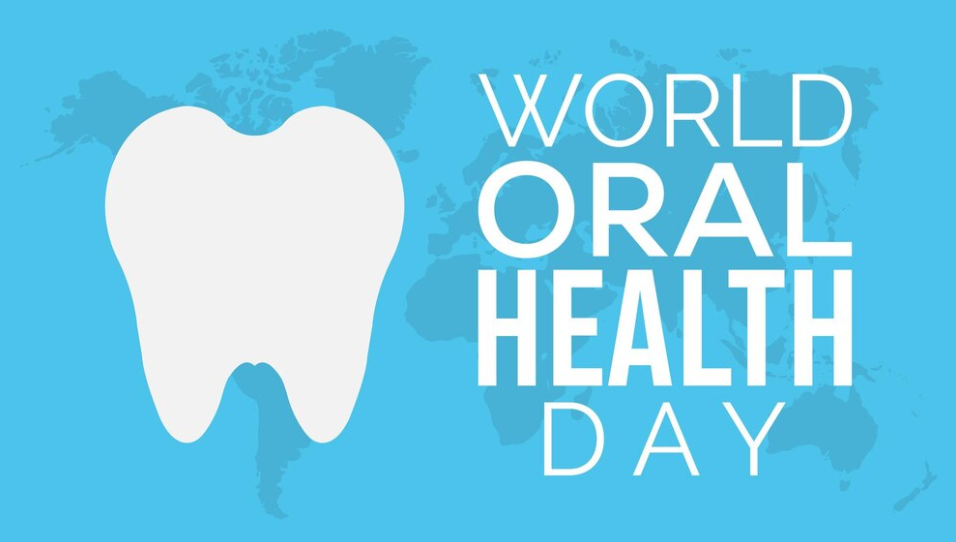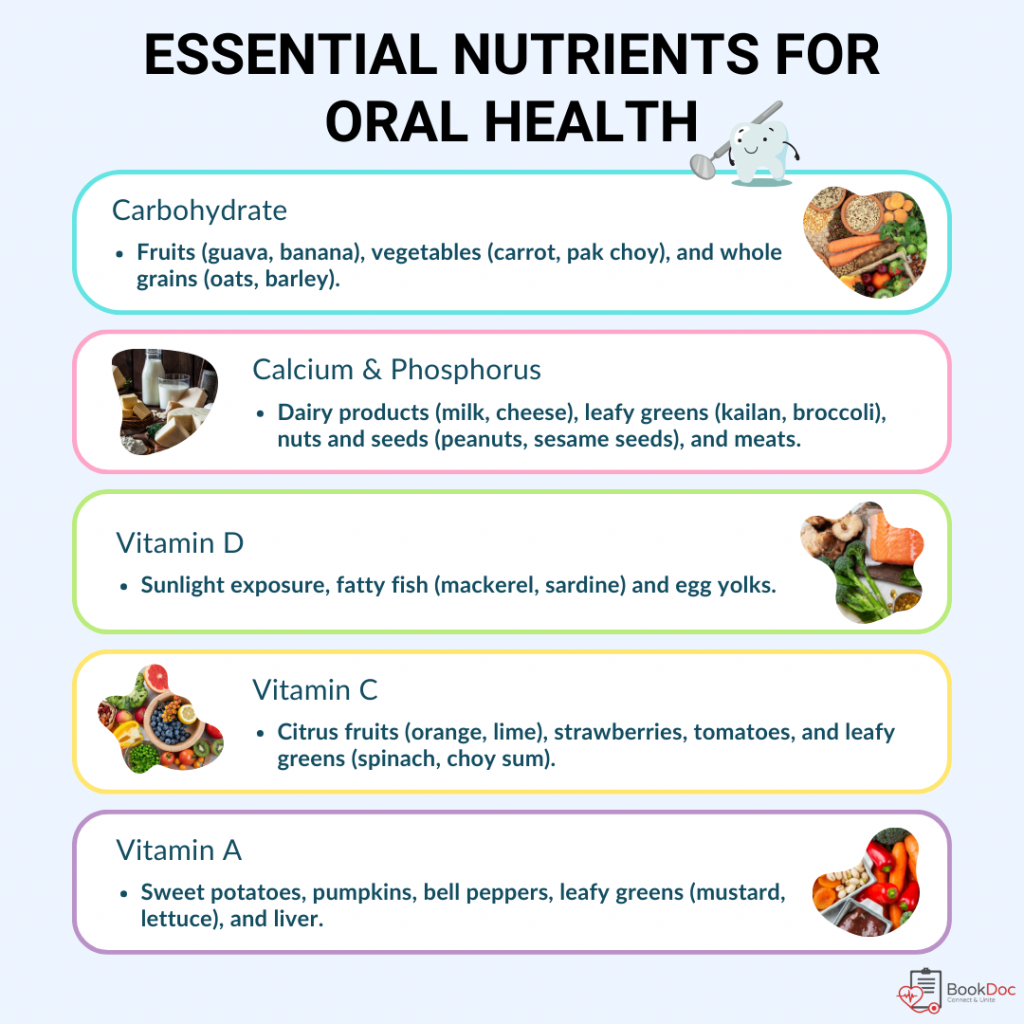
As we observe World Oral Health Day this year, it is vital to understand the deep connection between oral health and overall well-being. Under the theme “A Happy Mouth, Is A Happy Body” designated by the World Dental Federation (FDI), we stress the importance of oral hygiene and accessible dental care. According to the WHO Global Oral Health Status Report (2022), oral diseases affect nearly 3.5 billion people worldwide, impacting both dental and systemic health significantly.
Nutrition’s Role in Oral Health
Nutrition plays a critical role in influencing infection and inflammation. Malnutrition weakens the immune system, raising the risk of oral infections like dental caries and periodontal diseases. Conditions such as acute necrotising ulcerative gingivitis (ANUG) and cancrum oris (Noma) pose specific risks to malnourished individuals, highlighting the importance of proper nutrition.
Essential Nutrients

- Carbohydrates: Simple carbohydrates are broken down into simpler sugars like glucose, fructose, and galactose during digestion. These sugars can fuel harmful bacteria growth in the mouth when consumed in excess, leading to acidic byproducts that cause tooth decay and gum inflammation. Hence, go for high-fibre carbohydrates such as fruits, vegetables, and whole grains that boost oral health by reducing bacterial growth.
- Calcium and Phosphorus: Calcium preserves tooth and bone integrity, forming tooth enamel and dentin, which are crucial for protection against decay and gum disease. Phosphorus collaborates with calcium to construct robust dental structures and supports tissue repair.
- Vitamin D: Vitamin D aids in the absorption of calcium and phosphorus, essential for strong teeth and bones. It also supports immune function and reduces inflammation, enhancing the body’s ability to fight oral infections.
- Vitamin C: Vitamin C acts as an antioxidant, reducing inflammation and the risk of periodontal disease, preserving gum tissue, and preventing tooth loss. It is vital for collagen synthesis and maintaining oral tissue integrity.
- Vitamin A: Vitamin A supports mucous membrane integrity, salivary gland function, and immune response, reducing the risk of infections and promoting faster healing.
Nutritional Impact on Oral Health
- Dental Erosion: Dental erosion happens when acids wear away the hard tissues of the teeth such as enamel and dentin. These acids often come from acidic foods like fruit juices and soft drinks. To prevent erosion, limit acidic beverage intake, stimulate saliva production to neutralise acids, and avoid prolonged acid contact with teeth.
- Dental Caries: Dental caries, commonly known as tooth decay, occurs when sugars in food interact with oral bacteria, forming acids that break down enamel and create cavities. Balancing sugar intake with nutrient-rich foods like those high in calcium, phosphate, and fibre can strengthen enamel and lower the risk of cavities.
- Periodontal Disease: Periodontal disease affects gums and supporting tooth structures. Deficiencies in vitamins such as A and C and minerals like calcium can weaken gum tissues, making them more prone to infections and inflammation. A balanced diet rich in these nutrients and good oral hygiene practices help prevent periodontal disease.
- Diseases of Oral Mucosa: Conditions like Recurrent Aphthous Stomatitis (RAS), glossitis, and cheilitis may indicate deficiencies in vitamins such as B and minerals like iron and folate. Addressing these nutrient deficiencies through dietary adjustments or supplements can improve oral mucosal health and reduce symptoms.
- Oral Cancer: Dietary factors can influence oral cancer risk. Consuming foods high in protective nutrients such as vitamins A, C, and E, beta-carotene, selenium, and certain minerals may lower the risk. Conversely, consuming substances like areca nuts (pinang) and betel quid (a mix of betel leaf or sirih, areca nut, slaked lime, spices, and sometimes tobacco), which contain carcinogens, can increase the risk. A balanced diet low in carcinogens and rich in protective nutrients helps prevent oral cancer.
Nutrition is crucial for maintaining healthy teeth, gums, and oral tissues. By choosing nutrient-rich foods and practising mindful eating habits, we can protect our oral health and lower the risk of dental problems. Recognising nutrition’s role in oral well-being emphasises the need for holistic healthcare approaches. Let us embrace the power of nutrition to care for our smiles and preserve our oral health.
Yamie, Dietetics Intern
References:
- Oral health. World Health Organization (WHO). Retrieved from: https://www.who.int/news-room/fact-sheets/detail/oral-health
- Nutrition and oral health. ADA. Retrieved from: https://www.ada.org/resources/ada-library/oral-health-topics/nutrition-and-oral-health#:~:text=Calcium%20is%20a%20mineral%20found,mineral%20in%20bone%20and%20enamel
- How vitamins and minerals affect your teeth. Sakra World Hospital. Retrieved from: https://www.sakraworldhospital.com/blogs/how-vitamins-and-minerals-affect-your-teeth/298#:~:text=Calcium%20is%20a%20vital%20mineral,to%201%2C200%20mg%20per%20day
- Nutrition for oral health and oral manifestations of poor nutrition and unhealthy habits. General Dentistry. Retrieved from: https://www.agd.org/docs/default-source/self-instruction-(gendent)/gendent_nd17_aafp_pflipsen.pdf
- Nutrition and oral health. Disease-a-Month. Retrieved from: https://www.sciencedirect.com/science/article/pii/S0011502918301287?via%3Dihub#sec0002
- Nutrition and oral health. News-Medical. Retrieved from: https://www.news-medical.net/health/Nutrition-and-Oral-Hygiene.aspx
Looking for a dentist to guide you on maintaining optimal oral health?
Explore here to find an experienced dentist who can address your concerns and offer personalized advice to maintain a healthy smile.













